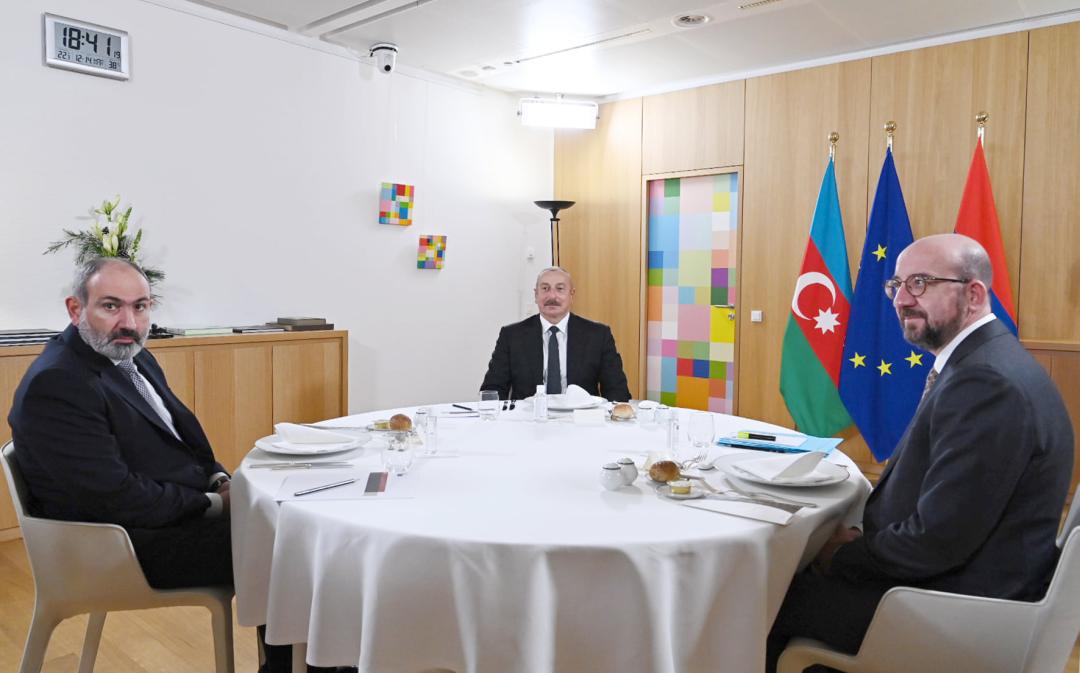
Aliyev-Pashinyan meeting in Brussels from Armenian and Azerbaijani perspective

On December 15, Nikol Pashinyan and Ilham Aliyev met in Brussels on the initiative of Charles Michel, head of the European Council.
Following the meeting, the President of Azerbaijan and the Prime Minister of Armenia reiterated their commitment to the trilateral accords negotiated with Russia's mediation, according to Charles Michel. The success in creating communication between the defence agencies was highlighted by both presidents. The European Council suggested that Yerevan and Baku establish a forum for the growth of economic cooperation and the strengthening of trust.
Armenian and Azerbaijani experts assessed the meeting between Aliyev and Pashinyan.
Armenian political expert Benyamin Poghosyan said that “Azerbaijan and Armenia should announce a position in the spring of 2025 about the extension of the term of the Russian peacekeeping force deployed in Nagorno-Karabakh. Most likely, Azerbaijan will also have a problem of border and customs control with this issue hinting that if Azerbaijani customs are not imposed in Lachin corridor, Armenia will also refuse a road without customs and passport control in Syunik region grant to Azerbaijan, then Azerbaijan may demand the removal of Russian peacekeepers.”
"We should not expect the Brussels meeting to form any new platform, alongside the troika of co-chairs and the Armenia-Russia-Azerbaijan format. This is likely to be a one-off initiative. One way or another, the leaders of Armenia and Azerbaijan would have gone to the Eastern Partnership summit. All things considered; it was decided to organise a meeting of the heads of the two opposing states in parallel. This is a [common] international practice," Poghosyan highlighted.
A political analyst Fikret Mammadov from Azerbaijan assessed meeting in Brussels:
"Interest in the Brussels meeting has also increased due to the certain inconclusiveness of the Sochi meeting. The intergovernmental commission failed to reach a decision on December 1, although it was announced by Russian President Putin. After this meeting, Russian Foreign Minister Sergey Lavrov phoned only his Armenian colleague and ‘emphasised’ the implementation of the decisions taken."
"The meetings in Brussels are the next stage in forcing peace on Armenia, already at the European level. After the Brussels talks, Pashinyan can say that Europe has also ‘given the go-ahead’ to open communications and begin the process of defining the border, thereby neutralising both pro-Russian and pro-Western opposition. This is a new chance for Pashinyan to avoid other losses which are inevitable if he stubbornly refuses to compromise this time too," Mammadov added.
Armenia’s former Foreign Minister Ara Ayvazyan is not expecting any breakthrough from the meeting between Pashinyan and Aliyev. The former minister welcomed any efforts to hold a dialogue, adding, that the agreements reached during the talks have not been complied with.
“I do not think there will be any breakthrough. We have repeatedly witnessed an escalation of the situation,” Ayvazyan added.
Areg Kochinyan, an expert on military-political issues suggested that the European partners are creating this alternative platform in order to create problems for Russia.
“If the West is really interested in stopping certain processes in this region and restoring its geopolitical positions, it will be able to exert sufficient pressure [on Azerbaijan] on at least one issue – for example, the return of Armenian prisoners, since there cannot be an alternative opinion on this issue – they must be returned. If the West is not interested, and this is nothing more than its multi-regional response to the tension in Ukraine, then we will not see this indicator [usefulness] either” he added.
The West wants to turn the issue of corridors in the confrontation between Azerbaijan and Armenia against Russia, said political observer Agshin Kerimov.
“According to Pashinyan, Aliyev’s statement on the Zangezur corridor has nothing to do with the negotiations held so far and the agreements that have been signed. The West, in turn, is trying to reduce the level of Russia’s influence on the peacekeeping process. But does it have the leverage for the practical fulfilment of this desire? So far, they are not visible, but there is no need to rush in this matter either. In the coming months, the course of events will show us what conclusions can be drawn from this,” the political observer noted.
An expert on the Karabakh conflict, coordinator of the Armenian research centre "Ani" Tatul Hakobyan does not think that Armenia could agree with Ilham Aliyev's idea that the Zangezur corridor should coincide with the Lachin corridor in terms of its access plan.
“The Zangezur and Lachin corridors cannot have the same statuses, since Nakhchivan is de facto not an enclave. It is an autonomous republic within Azerbaijan, which is recognised and has borders with Turkey and Iran,” Hakobyan said. "Karabakh is an enclave, and a corridor with Armenia is vital."
“Charles Michel's statement mentions the principle of countries' sovereignty over communications that pass through their territory and the importance of customs inspection. That is, this principle will also apply to the Lachin corridor, as Ilham Aliyev spoke about,” Farhad Mammadov, an Azerbaijani political scientist and expert of the Valdai International Discussion Club stated.
It is important to note that on December 16, spokeswomen of Russian Foreign Ministry Maria Zakharova stated that "Russia welcomes the continuation of direct talks between Azerbaijan and Armenia."
“The meeting of the two leaders was held on Dec. 14 evening, the information about the meeting is still being spread,” the spokesperson said. “Our experts are analysing it.”
“We hope that the results of the Brussels discussions will contribute to the further implementation of the trilateral agreements of the leaders of Azerbaijan, Armenia and Russia, which were reached at the previous meetings," Zakharova added.
See Also


Armenia Records 5.9% GDP Growth in 2024, Missing 7% Goal

Yerevan Balances Strategic Ties with Both US and Russia, Says Foreign Minister

FM Mirzoyan: Peace Deal with Azerbaijan Is Within Reach

Pashinyan and Erdogan Hold Call, Reaffirm Commitment to Ongoing Dialogue

